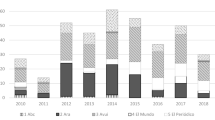Abstract
The purpose of this article is to assess the state of the discipline of British politics. The article takes as its starting point the historic emergence of the first coalition government since the end of Second World War and the impact of its politics of retrenchment. From here the Conservative–Liberal Democrat Coalition's controversial higher education reforms in England are evaluated and the focus is unsurprisingly on the significant increase of tuition fees from September 2012, but also on the wider implications of the Browne Report. The article then analyses the changes in the discipline in the recent past, which reflect the tumultuous global events of the 1990s and the internationalisation of political science. The article then surveys the current obstacles and pressures that face scholars working in British politics such as the Research Excellence Framework and the emerging culture of the necessity for research income and its effects on scholarship. The article concludes with an argument for the efficacy of British politics as a discipline within political science.
Similar content being viewed by others
Notes
The English institutions that have publicly stated from September 2012 that their fees will be £9000 per year for full-time undergraduate courses are: Aston, Bath, Bath Spa, Bedfordshire, Birmingham, Bradford, Brighton, Brighton and Sussex Medical School, City University London, De Montfort, Durham, Edgehill, Essex, Exeter, Falmouth, Goldsmiths University of London, Harper Adams, Hull, Imperial College London, Keele, Kent, King's College London, Lancaster, Leeds, Leicester, Lincoln, Liverpool, Liverpool John Moores, Loughborough, Manchester, Middlesex, Newcastle, Nottingham, Oxford, Oxford Brookes, Plymouth, Queen Mary University of London, Reading, Royal Agricultural College, Royal Holloway, Royal Veterinary College, School of Oriental and African Studies, Sheffield, Southampton, St. George's London, Surrey, Sussex, University of the Arts, University College London, University of Central Lancashire, University of East Anglia, University of East London, University of the West of England, Warwick, Westminster and York (BBC, 2011).
Centre for British Politics, Department of Politics and International Studies, University of Hull, http://www2.hull.ac.uk/fass/politics/research/research-centres/centre-for-british-politics.aspx.
Centre for British Politics, School of Politics and International Relations, University of Nottingham, http://www.nottingham.ac.uk/cbp/index.aspx.
References
Allen, N. and Bartle, J. (2010) Britain at the Polls 2010. London: Sage Publications.
BBC. (2011) University tuition fee list. 20 July, http://www.bbc.co.uk/news/education-12880840.
Beech, M. (2011) A tale of two liberalisms. In: S. Lee and M. Beech (eds.) The Cameron-Clegg Government: Coalition Politics in an Age of Austerity. Basingstoke: Palgrave Macmillan, pp. 267–279.
Bogdanor, V. (2011) The Coalition and the Constitution. Oxford: Hart Publishing.
Browne, J. et al (2010) Securing a sustainable future for higher education: An independent review of higher education & student finance, http://www.bis.gov.uk/assets/biscore/corporate/docs/s/10-1208-securing-sustainable-higher-education-browne-report.pdf.
Cameron, D. (2011) How we will release the grip of state control. Telegraph 21 February.
Collini, S. (2010) Browne's gamble. London Review of Books 32 (21): 23–25.
Eaton, G. (2010) Cracks in the coalition on immigration. Staggers: The New Statesman Rolling Blog, 28 July, http://www.newstatesman.com/blogs/the-staggers/2010/07/cameron-cap-immigration-cable.
Eaton, G. (2011) The coalition will not last five years, say voters. Staggers: The New Statesman Rolling Blog, 10 May, http://www.newstatesman.com/blogs/the-staggers/2011/05/coalition-voters-2015.
Forsyth, J. (2011) To see whether the coalition will last, watch how the Lib Dems respond to Dilnot. Coffee House: The Spectator Blog, 4 July, http://www.spectator.co.uk/coffeehouse/7069678/to-see-whether-the-coalition-will-last-watch-how-the-lib-dems-respond-to-dilnot.thtml.
Gamble, A. (1990) Theories of British politics. Political Studies 38 (3): 404–420.
Geddes, A. and Tonge, J. (2010) Britain Votes 2010. Oxford: Oxford University Press.
Grice, A. (2010) First cracks in coalition as Tories query Europe and vote reform policies. The Independent 14 May, http://www.independent.co.uk/news/uk/politics/first-cracks-in-coalition-as-tories-query-europe-and-vote-reform-policies-1973091.html.
Heffernan, R., Cowley, P. and Hay, C. (2011) Developments in British Politics 9. Basingstoke: Palgrave.
HM Treasury. (2010) Spending Review. London: HMSO.
Kavanagh, D. and Cowley, P. (2010) The British General Election of 2010. Basingstoke: Palgrave.
Kerr, P. and Kettell, S. (2006) In defence of British politics: The past, present and future of the discipline. British Politics 1 (1): 3–25.
Laws, D. (2010) 22 Days in May. London: Biteback.
Lee, S. (2011) “We are all in this together”: The coalition agenda for British modernization. In: S. Lee and M. Beech (eds.) The Cameron-Clegg Government: Coalition Politics in an Age of Austerity. Basingtsoke: Palgrave Macmillan, pp. 3–23.
Lee, S. and Beech, M. (2011) The Cameron-Clegg Government: Coalition Politics in an Age of Austerity. Basingtsoke: Palgrave Macmillan.
Lindblom, C. (1957) Review: In praise of political science. World Politics 9 (2): 240–253.
Morgan, J. (2010) Fears made flesh: Only STEM teaching grants spared CSR scythe. Times Higher Education Supplement, 20 October, http://www.timeshighereducation.co.uk/story.asp?storycode=413956.
Vincent, A. (2011) Ideology and the university. The Political Quarterly 82 (3): 332–340.
Willetts, D. (2010) Statement on higher education funding and student finance. House of Commons, 3 November, http://www.bis.gov.uk/news/speeches/david-willetts-statement-on-HE-funding-and-student-finance.
Willetts, D. (2011a) The arts humanities and social sciences in the modern university. British Academy, 1 March, http://www.bis.gov.uk/news/speeches/david-willetts-arts-humanities-social-sciences.
Willetts, D. (2011b) The Guardian higher education summit. London, 16 March, http://www.bis.gov.uk/news/speeches/david-willetts-guardian-he-summit.
Wilson, R. (2010) 5 Days to Power. London: Biteback.
Acknowledgements
I am grateful to Arthur Aughey, Kevin Hickson and Philip Norton for reading and commenting on an earlier version of this article. Any errors are of course my own.
Author information
Authors and Affiliations
Rights and permissions
About this article
Cite this article
Beech, M. State of the discipline: British politics in a cold climate. Br Polit 7, 4–16 (2012). https://doi.org/10.1057/bp.2011.31
Published:
Issue Date:
DOI: https://doi.org/10.1057/bp.2011.31



